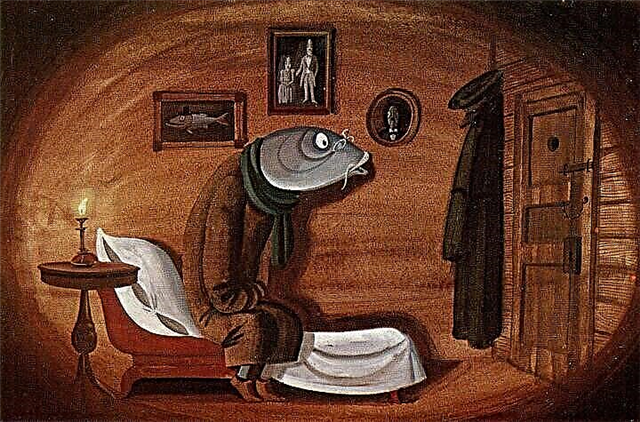Alcest did not cease to amaze people close to him with his temper, convictions and actions, and now he even refused to regard his old friend Filint as a friend because he talked too cordially with a man whose name he could only later recall with great difficulty. From the point of view of Alceste, thereby his former friend showed low hypocrisy, incompatible with genuine spiritual dignity. In response to Filint’s objection that, supposedly, living in society, a person is not free from the decencies required by mores and customs, Alcest decisively branded the godless abomination of secular lies and pretense. No, Alzest insisted, always and under any circumstances people should be told the truth in person, never stooping to flattery.
Alceste not only declared aloud to his beliefs, but also proved in practice. So, for example, he flatly refused to seduce the judge, on whom the outcome of an important litigation depended on him, and Alcest came to the house of his beloved Selimena, where he was caught by Filint, to purify her soul from the scum of sin, inspired by love - peculiar to the spirit of the time of frivolity, coquetry and the habit of proverb; and let such speeches be disagreeable to Selimene ...
The conversation of friends was interrupted by a young man named Orontes. He, like Alceste, had tender feelings for a charming coquette and now wished to submit to the court of Alceste with Filinto a new sonnet dedicated to her. After listening to the work, Filint awarded him with elegant, non-binding praises, which unusually pleased the writer. Alceste spoke sincerely, that is, to smithereens smashed the fruit of Oront's poetic inspiration, and with his sincerity, as one would expect, he made himself a mortal enemy.
Selimena was not accustomed to having admirers — and she had a lot of them — seeking dates only to grumble and curse. And just so Alcest behaved. He most vehemently denounced the frivolity of Selimena, the fact that, to one extent or another, she gives the favor of all the gentlemen curling around her. The girl objected that it was not in her power to stop attracting fans - she already does nothing for this, everything happens by itself. On the other hand, it’s not nice to drive them all from the doorway, all the more so since it’s nice to take attention signs, and sometimes when they come from people who have weight and influence - and it’s useful. Only Alceste, said Selimena, really loved her, and it is much better for him that she is equally friendly with everyone else, and does not single out anyone from among them and does not give any reason for jealousy. But even such an argument did not convince Alcest of the benefits of an innocent windiness.
When Selimene was informed of two visitors — the court dandies of the Marquis of Akaste and the Marquis of Clytandra — Alcesto felt disgusted and left; rather, having overcome himself, he remained. Selimena’s conversation with the marquises developed exactly as Alcest expected - the hostess and guests tastefully washed the bones of a secular acquaintance, and in each they found something worthy of ridicule: one is stupid, the other is boastful and conceited, no one would support acquaintances, if not the rare talents of his cook.
The sharp tongue of Selimena earned the stormy praise of the Marquises, and this filled the cup of patience of Alceste, who until then did not open his mouth. He wholeheartedly branded the slander of the interlocutors, and the harmful flattery with which the fans indulged the girl's weaknesses.
Alceste decided not to leave Selimen alone with Acastus and Clythander, but the gendarme prevented him from fulfilling this intention, having appeared with the order to immediately bring Alceste to control. Filint persuaded him to obey - he believed that the whole matter was a quarrel between Alcest and Orontes over a sonnet. Probably, the gendarme administration decided to reconcile them.
The brilliant court gentlemen Acast and Clythander are accustomed to easy successes in heart affairs. Among the admirers of Selimena, they resolutely did not find anyone who could compete with them at all, and therefore concluded such an agreement between themselves: which of the two will present more compelling evidence of the beauty of the beauty, then the battlefield will remain; the other will not bother him.
Meanwhile, Arsinoe, who was considered, in principle, her friend, came to visit Selimena. Selimena was convinced that the modesty and virtue of Arsinoe preached only involuntarily - insofar as her own miserable charms could not incite anyone to violate the boundaries of these very modesty and virtues. However, she welcomed the guest of Selimen quite kindly.
Arsinoe did not have time to enter, and then - referring to the fact that she was told to talk about it by the duty of friendship - she started talking about the rumor surrounding the name of Selimena. She herself, of course, did not believe a second idle speculation for a second, but nonetheless strongly advised Selimene to change her habits, which give rise to such ground. In response to Selimen - since friends should certainly tell any truth in the eye - said Arsinoe that they were chatting about herself: pious in the church, Arsinoe beats the servants and does not pay them money; seeks to hang nudity on canvas, but strives, would have the opportunity to entice his own. And the advice for Arsinoe at Selimena was ready: first to look after himself, and only then for his neighbors. Word for word, the argument of the friends had almost grown into a bicker, when Alceste returned by the way.
Selimena withdrew, leaving Alcesta alone with Arsinoe, who had long been secretly indifferent to him. Wishing to be pleasant to the interlocutor, Arsinoe talked about how easily Alceste has people for himself; taking advantage of this happy gift, she thought, he could succeed at court. Extremely dissatisfied, Alcest answered that a court career is good for anyone, but not for him - a man with a rebellious soul, courageous and disgusted with hypocrisy and pretense.
Arsinoe hastily changed the subject and began to defame Alceste Selimenu, who allegedly meanly cheated on him, but he did not want to believe unfounded accusations. Then Arsinoe promised that Alcest would soon receive reliable evidence of the cunning of her lover.
What Arsinoe really was right about is that Alceste, despite his oddities, had the gift to win over people. Thus, the cousin of Selimena, Eliant, who in Alcesta was bribed by a rare in other honesty and noble heroism, had a deep emotional inclination towards him. She even admitted to Filinth that she would gladly become Alceste's wife when he was not passionately in love with another.
Filint, meanwhile, was genuinely perplexed as to how his friend could have inflamed Selimene with a sense of rotation for the turtle and not prefer her with a model of all virtues - Eliant. The alliance of Alcest with Eliant would have pleased Filint, but if Alcest had nevertheless been married to Selimena, he himself would have offered Eliante his heart and hand with great pleasure.
The declaration of love did not let Filint Alcest, who burst into the room, all blazing with anger and indignation. He had just fallen into the hands of Selimena's letter, fully exposing her infidelity and treachery. The letter was addressed, according to the person who transmitted it to Alcest, the rhyme plaque Oront, with whom he had barely managed to reconcile with the mediation of the authorities. Alceste decided to permanently break with Selimena, and in addition, in a very unexpected way, to take revenge on her - to marry Eliantha. Let the insidious see what happiness has deprived herself!
Eliantha advised Alcesta to try to reconcile with her lover, but he, seeing the Selimena, brought down on her a hail of bitter reproaches and insulting accusations. Selimena did not consider the letter reprehensible, since, according to her, the addressee was a woman, but when the girl was tired of assuring Alcest of her love and hearing only rudeness in response, she announced that, if he pleased, she wrote to Oront, charmed her with his countless virtues.
A stormy explanation was put to an end by the appearance of the frightened servant of Alceste, Dubois. Every now and then getting lost in excitement, Dubois said that the judge - the one whom his master did not want to clean up, relying on the integrity of justice - made an extremely unfavorable decision on the Alceste litigation, and therefore now both of them, in order to avoid major troubles, need to leave town as soon as possible.
No matter how much Filint persuaded him, Alcest flatly refused to file a complaint and challenge a deliberately unjust sentence, which, in his opinion, only once again confirmed that dishonesty, lies and debauchery reign supreme in society. He will withdraw from this society, and for his deception, the money selected will receive the undeniable right to shout at all angles about the evil lie that rules on earth.
Now Alzest had only one thing left: to wait for Selimen to inform of an imminent change in his fate; if a girl really loves him, she will agree to share it with him, if not, then take a tablecloth.
But not one Alcest demanded the final decision from Selimena - the Orontes bothered her with the same. In her heart, she had already made a choice, but she was hated by public confessions, usually fraught with loud resentment. The situation of the girl was further aggravated by Acast and Clythander, who also wanted to get some clarification from her. In their hands was a letter from Selimena to Arsinoe - a letter, as before Alcesta, was supplied by the Marquis herself a jealous addressee, containing witty and very evil portraits of the seekers of her heart.
After reading aloud this letter was followed by a noisy scene, after which Akast, Clythander, Orontes and Arsinoe, offended and wounded, hastily bowed. The remaining Alcest for the last time turned to Selimena all his eloquence, urging him to go somewhere off the beaten path, away from the vices of light. But such dedication was beyond the power of a young creature spoiled by universal worship - loneliness is so terrible at twenty.
Wishing Filinto and Eliant great happiness and love, Alceste said goodbye to them, because now he had to go look around the world for a corner where nothing would prevent a person from always being completely honest.




 How to write well
How to write well


 Clarissa
Clarissa


